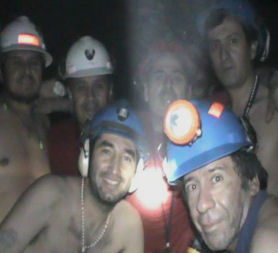What next for the 33 Chilean miners?
The 33 rescued Chilean miners have been sent iPods by Apple, and promised football tickets by major clubs. But the psychological pain of their ordeal is not over, an expert tells Channel 4 News.

From a tiny, dark, humid cave more than 625 metres underground to the flashbulbs of the world’s media.
The lives of the 33 Chilean miners rescued this week from a collapsed mine in San Jose have certainly changed.
A local singer and businessman has given them £10,000 each. Apple boss Steve Jobs has sent them all a new iPod. A Greek firm has offered an islands tour, and top football clubs Manchester United and Real Madrid have invited them to Europe to watch a game.
Reunited
At the same time, the miners have been reunited with their families. One became a father while he was trapped, one got engaged via video-link, and another was powerless to prevent the sticky situation of his wife meeting his mistress while he was incarcerated, as they both held a vigil at Camp Hope at the top of the mine.
“Those who have religious faith tend to do better. They find it helps them cope, and make sense of it.” Professor Stephen Joseph
But it should not be forgotten that they faced a truly horrendous ordeal, buried deep under the ground. For 17 days, no one believed they were even alive. They rationed food and water and lived in a small, dark, hot space, not knowing if they would ever escape.
And when they were found, they were warned that the rescue could take until Christmas.
While they were rescued considerably sooner, after only 69 days, they still hold the record for the longest survival underground after a mining accident.
A post-traumatic stress expert told Channel 4 News their reactions to the horrors they experienced should not be underestimated.
Post-traumatic stress
The University of Nottingham’s Professor Stephen Joseph said: “I think it’s very likely in the initial few weeks will have problems associated with post-traumatic stress disorder (PTSD), intrusive thoughts, bad dreams.
“But it is only when things like this become persistent, after one month, that PTSD is diagnosed.”
He said the miners would need support to get them through the first few weeks, but it might be better if this came from their friends and families – and indeed, each other – than from professionals.
“The key factor is social support – family, friends. One of the things people often crave is the company of those who have had a similar experience. It’s quite likely the miners will be drawn back to each other for companionship.
“I don’t think the counsellors should rush in at this stage. If they develop problems, then it is appropriate for there to be professional support. But what people need in these early days is information.
“When they have nightmares or flashbacks, people can be really terrified, even suicidal, thinking they are going crazy. But the information – that this is not unusual, the symptoms will probably go away over time, and they don’t have PTSD – is very important.”
Religious faith
A lot of the miners have talked about God, which could help them get over their experiences, he said. Mario Sepulveda, the second miner to be freed, said: “I have been with God and I’ve been with the devil…I seized the hand of God. I always knew God would get us out of there.”
Professor Joseph said: “It splits down the middle – some people find strength but others come back from war, conflict, or horrific trauma saying there is no way they can believe in a just and benevolent God.
“But those who have religious faith tend to do better. They find it helps them cope, and make sense of it.”
An Elvis Presley fan, a former professional footballer and a joker. Channel 4 News profiles the Chile 33
He said he doubted the miners would return underground in a hurry.
“People are so distressed by the reminders that they do just stay away,” he said. “People will have difficulty with going back down tunnels, things like that.”
Springboard
However Professor Joseph, who co-authored a book called “Post-traumatic stress (The Facts)” and whose research focuses on the effects on people’s lives after they face trauma, said the incident could actually end up changing the men’s lives – for the better.
“There is a lot of focus on the negative but for most people traumatic experiences can be a springboard for positive change,” he said.
“Up to 70 per cent of people report some kind of positive benefit – from feeling wiser, or more mature, to appreciating their family and friends more.
“They are not happy, they may still have problems, but with some time they embrace their new perspective and it can transform their lives. For many of them life will never be the same again – but that can be a good thing.”